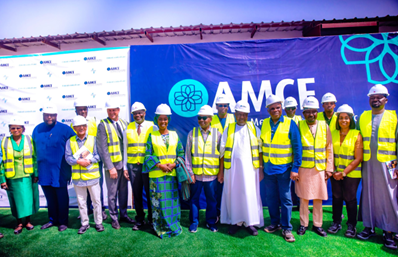The African Medical Centre of Excellence (AMCE), a landmark medical facility being developed by the African Export-Import Bank (Afreximbank) in collaboration with King’s College Hospital, London, recently hosted a high-level stakeholder and media tour to present key construction milestones and reaffirm its dedication to transforming healthcare in Africa.
The centrepiece of the initiative, a state-of-the-art medical city, is set to launch in June 2025, and promises to revolutionise healthcare access and quality in the region.
The tour, which was led by Prof. Benedict Oramah, President of Afreximbank and Chairman of AMCE’s Board of Directors, was attended by distinguished figures, including Senator Barau Jibrin, Deputy President of the Nigerian Senate; Senator George Akume, Secretary to the Government of the Federation; Mrs. Toyin Saraki, Founder-President of the Wellbeing Foundation Africa; and several other government officials, corporate CEOs, and executives. The attendees were given an exclusive walkthrough of the rapidly developing construction site, marking another significant step in the project’s timeline.
- Why Frequent Sex Doesn’t Prevent Prostate Cancer – Doctor
- Supreme Court Reserves Judgment on Four Appeals Concerning Rivers Political Crisis
During the visit, attendees were briefed on the construction progress, which has reached critical milestones, including the completion of civil and structural works, the installation of interior tiling, vinyl flooring, and lift systems, as well as the ongoing development of external infrastructure. These achievements are key to meeting the June 2025 launch date.
AMCE Abuja will offer a comprehensive range of services, including oncology, haematology, cardiovascular care, and general healthcare, aimed at addressing the pressing medical needs of Nigeria and the broader African region. With all civil and structural work completed as of February 2025, the hospital is now focused on the finishing stages, ensuring that it adheres to the highest standards of quality assurance and control.
Prof. Benedict Oramah expressed his confidence in the project’s potential to reshape Africa’s healthcare landscape. “The Africa Medical Centre of Excellence represents a defining moment in Africa’s pursuit of self-sufficiency in healthcare,” said Oramah. “This facility will provide world-class care to over 350,000 patients in its first five years, creating 3,000 jobs, and drastically reducing the need for medical tourism. By addressing the $1.1 billion lost annually to outbound medical travel, AMCE will strengthen Nigeria’s healthcare systems and boost intra-African trade in medical services.”
Oramah also emphasised that the initiative goes beyond infrastructure, calling it an investment in Africa’s future. “We are demonstrating that Africa has both the ambition and the capability to provide world-class healthcare for its people. The AMCE is not just a medical facility—it is a statement of intent, a symbol of progress, and a beacon of hope for a healthier, more self-reliant continent.”
Brian Deaver, CEO of AMCE, highlighted the long-term vision for the hospital. “AMCE is a bold step toward reshaping Africa’s healthcare future. By integrating cutting-edge technologies and innovative care models, we are building a sustainable healthcare ecosystem that sets new standards for medical excellence across the continent. Our goal is to improve patient outcomes, foster local innovation, and retain medical talent within the region,” said Deaver.
Senator Barau Jibrin, the Deputy Senate President, voiced his support for the initiative, saying, “The Africa Medical Centre of Excellence represents a transformative leap for healthcare in Nigeria and Africa as a whole. The Government of Nigeria is committed to supporting projects that enhance the quality of life for all Nigerians and further strengthen our healthcare infrastructure.”
Senator George Akume, Secretary to the Government of the Federation, added, “This project exemplifies what strategic investment and collaboration can achieve. Not only will it position Nigeria as a hub for world-class medical services, but it will also drive job creation, foster innovation, and improve healthcare access for all.”
As AMCE prepares for its grand opening, its ambitious plans extend beyond the first hospital. Future phases of the development include a second 350-bed facility, a medical and nursing school, a medical sciences foundation, a dedicated research centre, and medical residences, all designed to support both healthcare professionals and patients.
Through these ongoing developments, AMCE aims to build a sustainable foundation for medical research, talent development, and long-term health security. By creating a world-class ecosystem of healthcare, education, and research, AMCE is positioned to become a key player in Africa’s healthcare transformation, ensuring that Africa’s most complex medical needs are addressed within the continent.
The AMCE project is a testament to Africa’s growing capacity to tackle its own healthcare challenges, reducing dependency on overseas treatment and establishing itself as a leading hub for advanced medical care.




